This post may contain affiliate links. Please read our disclosure policy.
Do you feel like you are noticing the characteristics of a spoiled child? Do you feel like your sweet child turned into an ungrateful child? Have you ever wondered how to unspoil a child… or how to unspoil your child?
I know that this can be hard because you don’t even realize that it is happening and then BAM… you hear the disrespect in your child’s voice and realize that you need to STOP doing that for your child!
When you begin to see that your children are displaying the same spoiled behavior as ungrateful children, you know that it’s time to teach your kids how to be grateful again.
Before we begin, I do want to point out that there is no reason to feel guilty. You are here because you are ready to help your spoiled child get back to that kind, loving child that you know they are inside. To be honest, it probably started because you do love your child and you thought you were helping.
Whatever the case… we’re going to get back to the place that makes you BOTH happy & grateful.
With this post in mind, I asked many of my readers what they had done when they needed to help a spoiled child become more grateful and unspoiled. I know that this can be quite a challenge for many parents, so I hope that this gives you just the boost of confidence and knowledge that you need to know how to unspoil a child!
We don’t intend to have spoiled kids – it’s just the day & age that lends itself so easily to that, you know? According to a recent study, Dr. Bromfield reports that:
“A vast majority of parents — 94 percent, according to a recent survey — judge their children to be spoiled.”
It is hard when your child acts spoiled, because even though YOU may know that your child is loving and kind… it isn’t showing up that way. Others may begin to think of that child as a “spoiled brat” or a “spoiled child.”
They may try to offer advice on how to set limits or how to handle temper tantrums. Some may even offer parenting advice like “Spare the rod, spoil the child.” The phrase ‘spare the rod’ comes from Proverbs 13:24 – “Whoever spares the rod hates his son, but he who loves him is diligent to discipline him.” (there is more on this at Proverbs 22:15). However… I do not spank, and I do not agree with it.
I have always disagreed with the entire “spare the rod” concept because I just can’t see any benefit of physical discipline, corporal punishment, or anything to that nature.
I spent a semester in college studying the effects of spanking, among other things, and there is no evidence on the benefits of this, especially the long term.
I also try not to yell. I have always wanted our children to be respectful because it is the right thing to do. I want them to be kind because they respect others.
I want them to be generous because it brings them joy to bring others joy. I do not want them to do these things out of fear of being caught by their parents or teachers. If that were the case, I would worry about how they would act when we were not around. When I know that they are intrinsically motivated, I know that they will hold onto these values & beliefs.
You know your child best, so please remember that.
If a child is acting spoiled, it is most likely the parent’s doing… not the child’s doing.
Children can’t spoil themselves. It happens because of a child learning what to expect. Likewise, they most likely won’t have the tools to unspoil themselves. It is up to us, as parents, to help them.
Remember that while spoiling your child CAN happen by giving them too much without any appreciation, it can also just be that your child is not respectful of others or things.
It can also happen by accident…
We see a great deal on something that we think they’ll like. Since we love to see our children smile, we get it for them. The next time that we are out, we do the same thing. Soon, it’s become expected, instead of appreciated. Without even realizing that we are turning them into ungrateful people – we’ve done it.
That’s ok – because today is the day that we start the UNSPOILING! Spoiled children can be taught to be grateful, so they turn out to be responsible, respectful adults.
Before we move on… give yourself a pat on the back for taking this step! This is the hardest part… admitting that your child is spoiled or disrespectful.
10 Tips to Teach You How to Unspoil a Child
Before we begin, let me say that with everything, consistency is key in helping your spoiled child to be unspoiled. It’s worth repeating…
Consistency is key.
If you can stick to your rules, you will see much quicker results. This is the key to success, in my opinion. I saw this when I was a teacher, I see it as a play therapist and I see it as a mom.
Consistency is the key.
Every time that they ___, they get ___.
Example: With these swap chores for screentime cards… if they do chores, they earn screentime minutes.
Use the “When–>>Then” method.
When you ____, then you ____. (When you have done your chores, then you can use your phone. )
You are essentially giving your child a choice. You are not yelling. You are not upset. You are simply letting your child choose
- If they want to play, they need to finish cleaning. “When you finish cleaning, then you can play.”
- If your child wants to have a snack, he has to eat his vegetables. “When you finish your vegetables, then you can have a snack.”
- If she wants to go to the park, she needs to have her bed made. “When you make your bed, then you can go to the park.”
- If they want to play a game, they have to finish their homework. “When you have finished your work, then you can play your video games.”
- When you have filled up your reward jar (for being kind), then we can go out for ice cream.
Even though they only have a limited number of choices, it is still a choice. You are giving your child the power and they will decide how they want to proceed.
Set expectations.
Give your child a run-down of the day, if possible. Let them know what to expect.
Example: “We will be going to the store today. You will not be buying anything. If you ask for something while we are there, I will be taking away electronics for the remainder of the day.
I will have to do this because I am telling you RIGHT NOW that we are going to the store for groceries and nothing else. Do you understand?”
You are merely telling them ahead of time and asking them to respect what you say.
Stop buying unnecessary things for your child
Your child might ask you for something, or you might purchase un-needed stuff because they are..
- cute
- on-sale (this is what usually gets me!)
- fun
- educational.
However… your child does not need them.
While it is nice to buy them things and you feel like you are helping, you need to take a step back and ask yourself if you are teaching them that they can have whatever they want before you buy it, or ask yourself if they really do need it.
Plus, when you aren’t continually buying them things, they will appreciate it more when they do receive a gift.
Remember – you can say NO to things. In an article in the New Yorker, I read that “[French Parents] view learning to cope with ‘no’ as a crucial step in a child’s evolution. It forces them to understand that there are other people in the world, with needs as powerful as their own.” ~ Druckerman
Does your child take care of their things? Do they respect their things?
- Does your child think that you will replace broken toys right away?
- Do they just throw it into a toy box? Or are they carefully playing with it and storing their toys properly?
- If you took all of their toys away, would they cry because you did it?
- Or would they cry because they actually missed their toys?
- In other words- would it just be the thought of having no toys that bother them, or do they really miss their toys? I have found that most kids don’t even miss the toys being gone.
Teach them to buy things for themselves.
The value of hard work should never be overlooked. If your child wants something, tell them how much it costs and let them work hard to make that money. How wonderful they will feel when they can accomplish that on their own! They are so proud!
Have your child keep a list of things that he wants and how much it costs.
If your child wants a new scooter, he has a few options:
- Ask for it for his birthday
- Put it on his Christmas list and hope that he gets it.
- Save up his own money to buy it (you could even match his money. If he puts $5 into his piggy bank, you add $5, too.)
Teach your child to give.
A while back, I heard that you should get rid of one thing for every new thing that comes into the home. If your child gets a new toy, have them donate one to someone else (not a broken one or less-valuable one, but one that someone else will love.)
Try cutting back on what you have.
First – you don’t need it all.
Second – your child will be excited when he/she goes somewhere (church nursery or gym nursery or to a friend’s house) where there are new toys.
You don’t need it at your house, too. Less is more. Your child may become overwhelmed with too many toys, just like we become overwhelmed with too much stuff.
TIME matters more.
Spend more time doing things with your child. You don’t need to “buy” things for them. Just spend time with them. You can grab my free calendar & my FREE e-mail series on spending one-on-one time with your child:
If they act entitled or ungrateful, talk to them. Sit them down and explain it to them. THEN follow through with a consequence. Never use empty threats.
I learned once that I would never use a huge threat like “If you keep acting this way, we aren’t going to Disney this summer!” because I would never follow through with that.
Use the KISS method- Keep It Simple, Silly.
No TV for today.
No snacks today.
No playing with your friends today.
You get two extra chores today, etc.
It is really about you. Your child is mimicking what you have taught them. Be a great example.
Bonus Tip for How to Unspoil a Child:
This system below has worked WONDERS for getting our kids to help out (without any nagging or yelling).
If you want to start chores with your kids, but do not want to have to deal with a chore chart, try these Chore Cards. We have them & they are easy, and they are “normal” chores, like sweep the floors, dust, clean up the living room, etc… It makes it easy to say,
“Ok, everyone – go grab two chore cards, and then you are done, and you can go play.”
I even use them for screen time- we save up the minutes (write it on a sheet of paper), then when the kids want to play on their iPad or watch a show, they have to use the minutes that they’ve saved.
You can find the Swap Chores for Screentime Chore Cards here.
Good luck! You’ve got this one in the bag!
Are you looking for more parenting tips?
Check out the articles listed below…
Scary Truth about what’s Hurting Our Kids
Is your child whining? Try this!
How to stop yelling… and get your kids to listen!
Why Our Younger Kids are in Bed by 7:00
Stop doing that for your kids (it’s doing more harm than good)
Why Children are lonelier than generations before them…

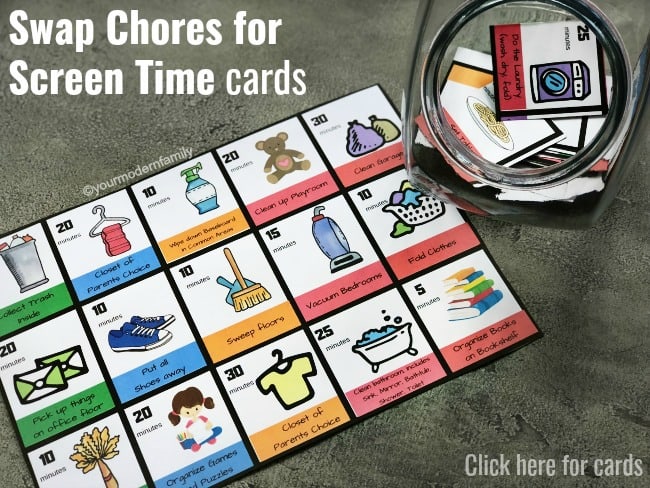
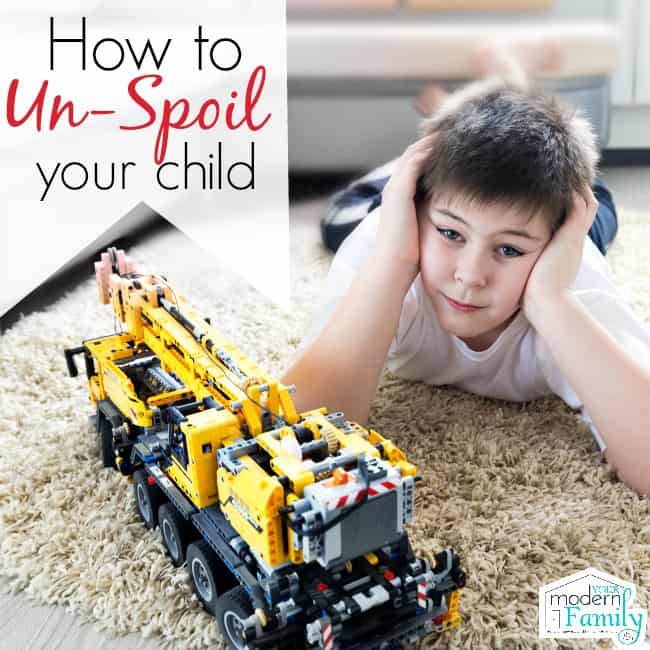
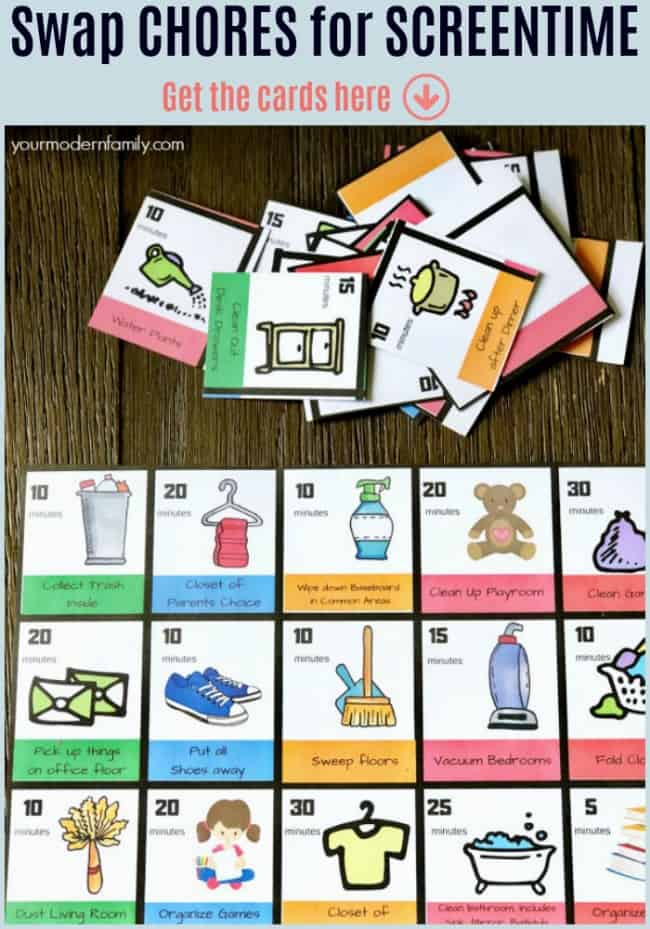


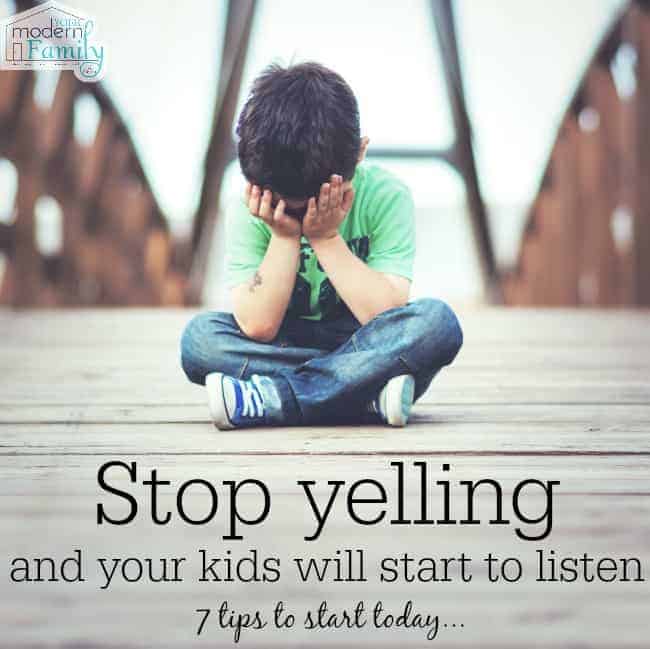



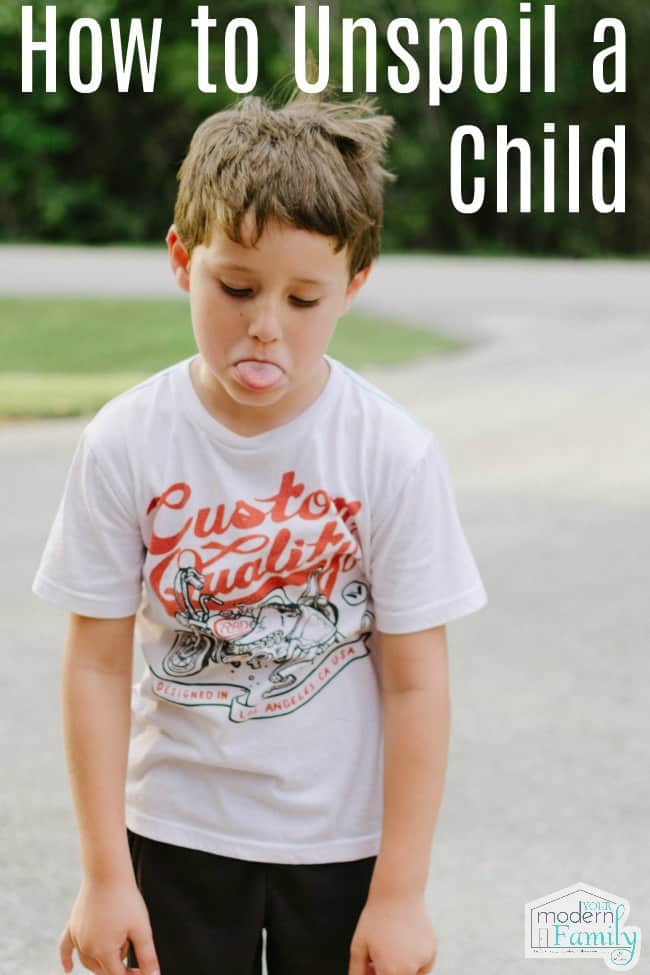














Wonderful post! When I had my first son it was just so much fun to buy all the new exciting baby things, and toddlers things, and we had to finally put a stop to it. My husband is still learning. He would still buy the boys a toy every day if he could. He has so much fun picking out little boy toys. Thanks for sharing these tips!
An important post with some very good advice. However, I couldn’t disagree more strongly with the advice under #3. It reminds me of the studies/experiments on dieting where they find that groups who are on a diet and go into a cocktail party eat MORE than the control group who is not instructed to restrict diet in any way. Therefore, in this example, you’re PRIMING your child to WANT more, then THREATENING them with a NEGATIVE consequence that is NOT a NATURAL consequence if they even ASK for something. In my view this is UNREALISTIC, UNNECESSARY and UNREASONABLE.
I’ve often bought things at the store that weren’t on my list…or used that shopping trip to gather ideas, to add items to a list I’m making…because I realized that a particular item is the perfect solution to remodeling/party supply/decoration/gift for someone’s birthday in two months, etc. My son is 3 1/2, and he doesn’t always ask for things even when surrounded by toys…nor does he always get what he asks for. But my husband and I ALWAYS have a reason for our decisions. And TALK is ALWAYS an option. You can always give your child a notepad and pencil and tell them they can write down/draw anything they see and like. My son LOVES making his own “lists”.
I agree “setting expectations” is crucial. Part of setting expectations is telling him where we’re going and when and simply not always buying extras when you go shopping. We set expectations through our BEHAVIOR as parents. Part of being reasonable is making sure he’s eaten (or brought healthy snacks) before he’s surrounded in the store by snacks that are colorful and attention-grabbing but I’d never buy him. Part of setting expectations is saying, “we don’t eat that because it has X ingredient, which isn’t good for us, but you CAN eat this apple.”…”we don’t need to buy that football because we have one at home, remember? do you want to play with it later? what other balls do we have at home that you could play with, too?” “we won’t be buying that (big-ticket item) today because it costs A LOT of money and we’d have to save up for that. Should we save money to buy that?” “you’re right, that looks like a GREAT book, should we see if they have it at the library?” Instead of saying “NO.” we say YES and NO/NO AND YES. And instead of cutting off communication before it happens, we TEACH decision-making. That’s a much more valuable and long-lasting lesson.
These tips were a collaboration given to me by my readers, but I can completely see where you are coming from. Thanks.
I couldn’t agree more. My 3 years old son doesn’t always ask for things that he wants. He always listens to me and he is negotiable. If I tell him upfront we only go there to buy groceries and other things especially junk food, he will nod his head and said “yes”, and he didn’t take any of it. There’s no need to emphasize on the consequences if he only want One cheap item that is healthy for him sometimes. My elder sister enforce the No.3 rule to her daughters, and her daughters complaint to me that her parents are weird. They’re over cheap to their daughters sometimes, I see my nieces don’t have nice outfits to wear. We have to buy it for them some times (not that the parents cannot afford), girls want to feel pretty too right. Now my nieces are pre-teen and teenagers, they lies and hide information from their parents, I can tell where that coming from. We must listen and respect our child if we want them to do the same for us.
I have found this to be true as well. When I patented traditionally, following the same/similar advice as given in the post, it was not creating the desired outcome. It was not helping them understand what I believed they should.
None of my kids have ever gotten all they have wanted. But telling them yes more, and reserving no for actual, factual reasons, not arbitrary ones have helped them make mindful choices. They never have to get rid of a belonging until they are ready, and yet they all willing give, and share, and downsize when it is their right timing and readiness.
Partnering with children of all ages is always more productive then control and coercion, no matter what “nice” label is attached to it. I learned that the hard way and can not get back the harm done to relationship. Thankfully, my kids have given grace and trust, just as they have received it from me.
As I knew better, I chose to do better. I am grateful that I was open to really hearing my oldest kids, so my younger ones got greater benefit and my older ones and I could heal breaches in relationships. Parenting can be tough. We parents can make it harder though, and we can come to make mindful choices that create more mutually respectful outcomes.
Hi there, I read this and thought it was alright if you have one of those children that you can’t control. I don’t think my child is spoiled but I do get her a lot of things when I can. I’m sure after you read that you will be probably think I’m either crazy or one of those moms that think their kid is an angel and can do no wrong. Well, I’m not either one of those and I do have an explanation for buying my child things. 8 years ago my husband and I had our first child together, a son. 6 months after he was born he passed away in his sleep and my husband found him the next morning unresponsive. The night before he passed away my husband never got a chance to spend time with him because he was busy working. My husband and I were very distraught and sad to know we could never give our son anything else after that. So, long story short from the day my daughter was born we shower her with endless love, affection, kisses, and we do take her to a lot of places and may buy her things that parents would think it’s too much but to me and my husband it’s not. In our heads we never know when it will end for one of us, so we do our very best to make sure that our daughter is happy each and everyday.
I think it is amazing that you can do these things for her and do not judge you AT ALL. 🙂
I’m so sorry for your loss- I’m sure a piece of your heart is missing and I wish I had words to help.
Thanks for sharing.
I just shared this on my FB page: Heaven is Smiling Above. It’s scheduled to post at 7 tonight. Thanks for the great list!
🙂 thanks!
I love this and wish there was a printable! We are going through this right now and our son turns 8 tomorrow. 🙂 Wish me luck and prayers! Thanks Becky!
OH- good idea on the printable!
Thank you so much
Understand that unspoiling a child is a gradual process. It takes time to spoil a child, and it will take time to teach new values and better behavior. Most children have natural impulses toward compassion and helping others. Cultivate these impulses by emphasizing how it feels good to make others feel good.
Exactly. 🙂
As a teacher I sre this more than ever inour classrooms today and parents that have no vlue what to do. Thank you for thesr tips to help then out.
As a grandmoyher of a 2 year old that lives with me, I have find myself being in this dame spot. We have hadto handle him with “kid gloves”for a while due to circumstances, but now he is becoming the brat child. We will definately be putting these tips to use with him.
Excellent council. If things don’t change I’m a little scared to see what the future will look like.
Wonderful tips here! I’m sharing now with my Facebook page. I especially love #8. I am incorporating giving and generosity into as much as we do as a family. In fact, doing good every day is my New Year’s resolution.
Thanks again for this great post!
Thank you!
Every time my kid makes his room I give him a dollar. That way I reward his good behavior and he gets to raise enough money to buy himself some toy.
Buying a toy or candy to calm down a crying child is tempting and the reward is quick but this behavior is disastrous in the long run. This will only make your child feel that he or she can scream to get what they want. What you should do instead is teach them good behavior and reward their good actions.
Hmm… I’d personally disagree with this as it teaches the child to do things merely for the sake of reward. I think kids should clean their room because they’re a part of the family and should participate in whatever helps the family life run smoothly. Are they perfect at contributing? Probably not, especially when they’re young, but the goal is to encourage and remind them and expect them to participate. Eventually they rise to the challenge on their own and become people who contribute to the world because they see a need and not only because they expect a reward. As far as buying them things, I think it’s good for them to wait… perhaps if they really want something, they can get it for birthday or Christmas? That also potentially separates the momentary satisfaction toys from real wants/needs.
Every responsible parent wants to raise well-mannered children who can handle responsibilities and challenges when it comes to finances. But what’s alarming is that we (parents) can only blame ourselves for spoiling our adorable angels.
Of course, you want to keep your child happy, but at the same time, you just cannot let them get away with everything and become ungrateful and spoilt teens and young adults.
I like your information…. as a grand parent, this info is great to use for us to have great or greator grandkids…. here is something you need to do…. I am not the best on electronic stuff… so I don’t know how to get this passed on to my daughters of my grandkids…. so you need to meet with your web designer and have in a couple of clicks where I can forward this (your website on to others….. I found this on face book and i am not the most faceboook literate person in the world.
Your info is great for parents of young kids….. you start now….. AS THE OLD SAYING GOES….. “YOU RAISE THEM RIGHT OR YOU RAISES THEM FOR LIFE.”….. SEEN THIS TOOOOOOOOO MANY TIMES.
I have a 9yr old. I am trying to take the first step here. I felt some type of way today after my child came home. The school asked if the students needed food at home for the weekends and my daughter raised her hand. This is for students who need food I said and she said we needed groceries because I couldn’t take her to Red Lobster because I had to buy groceries. I need help unspoiling her. She has everything given to her and she is getting disrespectful, outspoken at the wrong times, talking back, trying to tell me what to do for her and when to do it.
This is probably one of the most useful posts I’ve read. Thank you for posting this. My child is growing more disrespectful the older he gets and it’s not so much at home but to others and he’s made comments like ‘my daddy says I can have whatner I want’ (not reall true) but it’s what we’ve made him believe. Of course this was not on purpose but it’s the environment we’ve created. We took his toys and electronics a while ago because of his behavior at school and he cried at first but he hasn’t missed them. I’ve started a calendar of the days he does well and doesn’t behave so he has a visual and something to keep track of and rewards to strive for instead of just asking for things.
I love all of these tips! I have stepchildren, so it is easy to just want to buy whatever they want in order to gain some sort of approval. Silly, I know. I have definitely found that having my stepdaughter pay for things she really wants (vs. needs) has given her more responsibility and a sense of pride when she buys something herself. I also agree that #10 is most important when bonding with kids (especially step kids). Spending quality time and creating new memories lasts longer than whatever toy or game kids might want in the moment. When it comes to buying gifts for birthdays or holidays, I always try to invest in experience gifts rather than material goods.
I like your advice on setting expectations from the start too. I always go into a store expecting to be asked to buy one thing or another, but rarely vocalize with my stepdaughter that we will NOT be buying anything. I think we can avoid some arguments by setting up those expectations first. Same when it comes to setting expectations for chores to be done that day.
Thanks for this list!